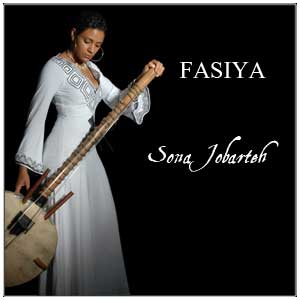Reviews October 13, 2011
Fasiya
Fasiya is unlike any other kora album out there. Sona Jobarteh is the first female kora virtuoso to come from a jeli (griot) family in West Africa, breaking down the normality of West Africaʼs male-dominated kora tradition. Coming from a long line of hereditary musicians and the West African Jobarteh jeli family, she is cousin of the kora maestro Toumani Diabate and granddaughter of jeli Amadu Bansang Jobarteh. Featured in the album are renowned West African musicians, such as Juldeh Camara. Born in London, Sona Jobarteh brings us an album that is full of grace, warmth and passion.
The album opens with "Jarabi", a song about love. Jobarteh brings this traditional kora piece into the realm of popular music, incorporating the kora with an electric guitar, drums and a muted guitar, whilst Jobartehʼs soulful, Malinke vocals, the djimbe and Karinyan, ensure that this popular kora piece remains traditional.
Fasiya is not just about the kora. On "Saya", Jobarteh sings passionately with her acoustic guitar, whilst the Fulani flute elegantly accompanies. The song is about loss and passing away, which not only shows through Jobartehʼs voice, but also the instrumentation. "Musow" (Women) is yet another track that diverts away from the kora, featuring the sabar and djembe drum and the acoustic guitar. It is a powerful track about the struggle for women, addressing those in Senegal, Gambia, Guinea and Burkina Faso, urging them to keep fighting and to never give up. It is a shame that the kora is not used in this track, which would have made this an even more empowering album - addressing gender issues whilst using a male-dominated instrument. Despite this, "Musow" is an emotional track and a highlight from the album.
Jobarteh continues to address social issues throughout Fasiya, with "Fatafina" (Africa) urging the children of Africa to come together. "The future is now in your hands" she sings in Mandinka, "what will we build for our descendants?" Another highlight on the album is "Mamake" (Grandfather), which again diverts away from the kora. Using vocals, guitars, calabash, bass and percussion, Jobarteh passionately dedicates the song to Amadu Bansang Jobarteh, "Although you are gone, your Griot mastery continues to inspire us to this day." Another key track is "Gainaako" (Cattle Hersman), an acoustic track with Juldeh Camara on the riti. Diverting away from the kora once again, Jobarteh sings in Fulbe, "All a Fula wants most is honour". The overall result is a beautiful, traditional, stand alone track.
More traditional instruments are featured in the album, with the balafon in "Suma" (Sorrow) and dun duns in "Fasiya" (Heritage), the closing track on the album, where Malinke lyrics address the descendants of Touramagan, a chief warrior of the Mande army.
Jobartehʼs voice is emotional throughout the album, informing listeners of her heritage. From empowering lyrics addressing social issues, to the narratives of tradition, Fasiya is not "just another traditional kora album". It represents where the kora stands today within the African diaspora, whilst also respecting tradition. Songs divert away from the instrument, allowing Jobartehʼs other instrumental talent shine through. The result is a major African following within London, whilst informing others about West African heritage.
-Louise Ungless









